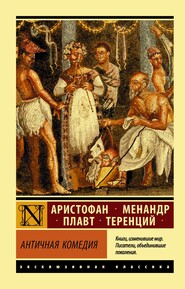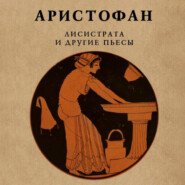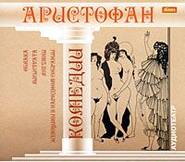По всем вопросам обращайтесь на: info@litportal.ru
(©) 2003-2024.
✖
The Eleven Comedies, Volume 1
Автор
Год написания книги
2018
Настройки чтения
Размер шрифта
Высота строк
Поля
SOCRATES. Then be seated on this sacred couch.
STREPSIADES. I am seated.
SOCRATES. Now take this chaplet.
STREPSIADES. Why a chaplet? Alas! Socrates, would you sacrifice me, like Athamas?[501 - Athamas, King of Thebes. An allusion to a tragedy by Sophocles, in which Athamas is dragged before the altar of Zeus with his head circled with a chaplet, to be there sacrificed; he is, however, saved by Heracles.]
SOCRATES. No, these are the rites of initiation.
STREPSIADES. And what is it I am to gain?
SOCRATES. You will become a thorough rattle-pate, a hardened old stager, the fine flour of the talkers…. But come, keep quiet.
STREPSIADES. By Zeus! You lie not! Soon I shall be nothing but wheat-flour, if you powder me in this fashion.[502 - No doubt Socrates sprinkled flour over the head of Strepsiades in the same manner as was done with the sacrificial victims.]
SOCRATES. Silence, old man, give heed to the prayers…. Oh! most mighty king, the boundless air, that keepest the earth suspended in space, thou bright Aether and ye venerable goddesses, the Clouds, who carry in your loins the thunder and the lightning, arise, ye sovereign powers and manifest yourselves in the celestial spheres to the eyes of the sage.
STREPSIADES. Not yet! Wait a bit, till I fold my mantle double, so as not to get wet. And to think that I did not even bring my travelling cap! What a misfortune!
SOCRATES. Come, oh! Clouds, whom I adore, come and show yourselves to this man, whether you be resting on the sacred summits of Olympus, crowned with hoar-frost, or tarrying in the gardens of Ocean, your father, forming sacred choruses with the Nymphs; whether you be gathering the waves of the Nile in golden vases or dwelling in the Maeotic marsh or on the snowy rocks of Mimas, hearken to my prayer and accept my offering. May these sacrifices be pleasing to you.
CHORUS. Eternal Clouds, let us appear, let us arise from the roaring depths of Ocean, our father; let us fly towards the lofty mountains, spread our damp wings over their forest-laden summits, whence we will dominate the distant valleys, the harvest fed by the sacred earth, the murmur of the divine streams and the resounding waves of the sea, which the unwearying orb lights up with its glittering beams. But let us shake off the rainy fogs, which hide our immortal beauty and sweep the earth from afar with our gaze.
SOCRATES. Oh, venerated goddesses, yes, you are answering my call! (To Strepsiades.) Did you hear their voices mingling with the awful growling of the thunder?
STREPSIADES. Oh! adorable Clouds, I revere you and I too am going to let off my thunder, so greatly has your own affrighted me. Faith! whether permitted or not, I must, I must shit!
SOCRATES. No scoffing; do not copy those accursed comic poets. Come, silence! a numerous host of goddesses approaches with songs.
CHORUS. Virgins, who pour forth the rains, let us move toward Attica, the rich country of Pallas, the home of the brave; let us visit the dear land of Cecrops, where the secret rites[503 - The mysteries of Eleusis celebrated in the Temple of Demeter.] are celebrated, where the mysterious sanctuary flies open to the initiate…. What victims are offered there to the deities of heaven! What glorious temples! What statues! What holy prayers to the rulers of Olympus! At every season nothing but sacred festivals, garlanded victims, are to be seen. Then Spring brings round again the joyous feasts of Dionysus, the harmonious contests of the choruses and the serious melodies of the flute.
STREPSIADES. By Zeus! Tell me, Socrates, I pray you, who are these women, whose language is so solemn; can they be demigoddesses?
SOCRATES. Not at all. They are the Clouds of heaven, great goddesses for the lazy; to them we owe all, thoughts, speeches, trickery, roguery, boasting, lies, sagacity.
STREPSIADES. Ah! that was why, as I listened to them, my mind spread out its wings; it burns to babble about trifles, to maintain worthless arguments, to voice its petty reasons, to contradict, to tease some opponent. But are they not going to show themselves? I should like to see them, were it possible.
SOCRATES. Well, look this way in the direction of Parnes;[504 - A mountain of Attica, north of Athens.] I already see those who are slowly descending.
STREPSIADES. But where, where? Show them to me.
SOCRATES. They are advancing in a throng, following an oblique path across the dales and thickets.
STREPSIADES. 'Tis strange! I can see nothing.
SOCRATES. There, close to the entrance.
STREPSIADES. Hardly, if at all, can I distinguish them.
SOCRATES. You must see them clearly now, unless your eyes are filled with gum as thick as pumpkins.
STREPSIADES. Aye, undoubtedly! Oh! the venerable goddesses! Why, they fill up the entire stage.
SOCRATES. And you did not know, you never suspected, that they were goddesses?
STREPSIADES. No, indeed; methought the Clouds were only fog, dew and vapour.
SOCRATES. But what you certainly do not know is that they are the support of a crowd of quacks, both the diviners, who were sent to Thurium,[505 - Sybaris, a town of Magna Graecia (Lucania), destroyed by the Crotoniates in 709 B.C., was rebuilt by the Athenians under the name of Thurium in 444 B.C. Ten diviners had been sent with the Athenian settlers.] the notorious physicians, the well-combed fops, who load their fingers with rings down to the nails, and the baggarts, who write dithyrambic verses, all these are idlers whom the Clouds provide a living for, because they sing them in their verses.
STREPSIADES. 'Tis then for this that they praise "the rapid flight of the moist clouds, which veil the brightness of day" and "the waving locks of the hundred-headed Typho" and "the impetuous tempests, which float through the heavens, like birds of prey with aerial wings, loaded with mists" and "the rains, the dew, which the clouds outpour."[506 - A parody of the dithyrambic style.] As a reward for these fine phrases they bolt well-grown, tasty mullet and delicate thrushes.
SOCRATES. Yes, thanks to these. And is it not right and meet?
STREPSIADES. Tell me then why, if these really are the Clouds, they so very much resemble mortals. This is not their usual form.
SOCRATES. What are they like then?
STREPSIADES. I don't know exactly; well, they are like great packs of wool, but not like women—no, not in the least…. And these have noses.
SOCRATES. Answer my questions.
STREPSIADES. Willingly! Go on, I am listening.
SOCRATES. Have you not sometimes seen clouds in the sky like a centaur, a leopard, a wolf or a bull?
STREPSIADES. Why, certainly I have, but what then?
SOCRATES. They take what metamorphosis they like. If they see a debauchee with long flowing locks and hairy as a beast, like the son of Xenophantes,[507 - Hieronymus, a dithyrambic poet and reputed an infamous pederast.] they take the form of a Centaur[508 - When guests at the nuptials of Pirithous, King of the Lapithae, and Hippodamia, they wanted to carry off and violate the bride. That, according to legend, was the origin of their war against the Lapithae. Hieronymus is likened to the Centaurs on account of his bestial passion.] in derision of his shameful passion.
STREPSIADES. And when they see Simon, that thiever of public money, what do they do then?
SOCRATES. To picture him to the life, they turn at once into wolves.
STREPSIADES. So that was why yesterday, when they saw Cleonymus,[509 - A general, incessantly scoffed at by Aristophanes because of his cowardice.] who cast away his buckler because he is the veriest poltroon amongst men, they changed into deer.
SOCRATES. And to-day they have seen Clisthenes;[510 - Aristophanes frequently mentions him as an effeminate and debauched character.] you see … they are women.
STREPSIADES. Hail, sovereign goddesses, and if ever you have let your celestial voice be heard by mortal ears, speak to me, oh! speak to me, ye all-powerful queens.
CHORUS. Hail! veteran of the ancient times, you who burn to instruct yourself in fine language. And you, great high-priest of subtle nonsense, tell us your desire. To you and Prodicus[511 - A celebrated sophist, born at Ceos, and a disciple of Protagoras. When sent on an embassy by his compatriots to Athens, he there publicly preached on eloquence, and had for his disciples Euripides, Isocrates and even Socrates. His "fifty drachmae lecture" has been much spoken of; that sum had to be paid to hear it.] alone of all the hollow orationers of to-day have we lent an ear—to Prodicus, because of his knowledge and his great wisdom, and to you, because you walk with head erect, a confident look, barefooted, resigned to everything and proud of our protection.
STREPSIADES. Oh! Earth! What august utterances! how sacred! how wondrous!
SOCRATES. That is because these are the only goddesses; all the rest are pure myth.
STREPSIADES. But by the Earth! is our Father, Zeus, the Olympian, not a god?
SOCRATES. Zeus! what Zeus? Are you mad? There is no Zeus.











